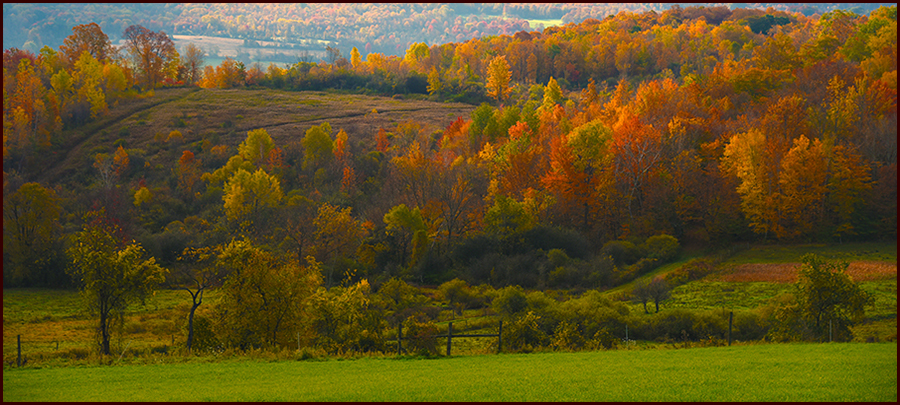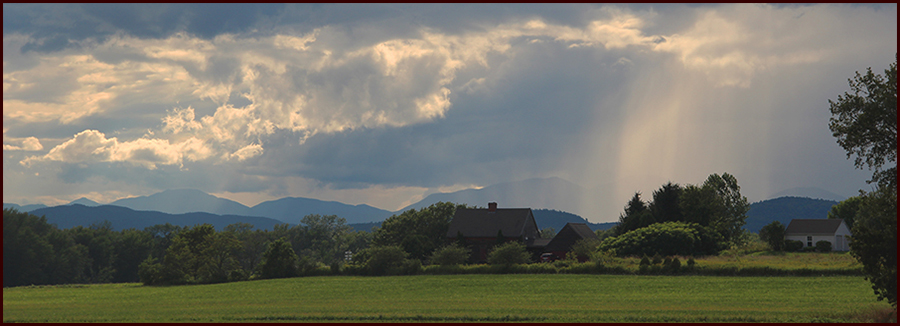Heartland Words and Music by Rex Benson and Steve Gillette
"There are only two reasons to farm: because you have to, and because you love to. The ones who choose to farm choose for love."
— Wendell Berry
Anger is one of the most difficult emotions to work with in a song. It spills out into a caricature of itself - hard to justify, and almost never ennobling for the singer. There are plenty of issues that invoke genuine anger, but for the voice of the song to serve that anger without seeming toxic requires some effort. Not something a record producer would want to take on.
Romance gone bad is easier to sing about with anger. "Hit the Road, Jack" and "You're No Good" and "Cry Me a River" have no difficulty keeping a straight face focusing on the object of their anger, and enlisting the empathy of the listener. But 'real' issues, like man's inhumanity to man, get ugly when the gloves come off. This song centers on the loss of a family farm, and the pain of the man who has failed to hold on to it. There is also a sub-plot of the treachery of the powers that be, way beyond his pay grade.
"The United States experienced a major agricultural crisis during the 1980s. Record production during this time led to a fall in the price of commodities. Exports fell, due in part to the 1980 United States grain embargo against the Soviet Union. Farm debt for land and equipment purchases soared during the 1970s and early 1980s, doubling between 1978 and 1984. Other negative economic factors included high interest rates, high oil prices and a strong dollar. By the mid-1980s, the crisis had reached its peak. Land prices had fallen dramatically leading to record foreclosures. The Farm Credit System experienced large losses, which were the first losses since the Great Depression." — Wikipedia
Immense forces were at work in the halls of power in the decade preceding the farm crisis. When Nixon was forced to close the gold window in August of 1971, he acknowledged that America was in default and that the promise of gold backing the dollar was no longer to be honored.
This had the result of disconnecting the dollar from any standard of value other than an arbitrary one simply declared to be the new norm. We enlisted the oil cartel (at the point of a gun) in a scheme which came to be known as the petrodollar. The significant thing about this is that once it became possible for the central bank to print money not tied to the value of gold, all hell broke loose. Cheap money, or 'hot money' as it's often called, began to subvert the traditional measures of value. Financialization and speculation became the order of the day.
"Farmers had freed themselves in part from the blind natural forces of storm and insects only to become increasingly the victims of the equally blind forces of market fluctuations." — Grant McConnell
Earl Butz, Secretary of Agriculture under both Nixon and Ford from 1971 to 1976, "is ... credited with advising farmers to plant 'from fence row to fence row' to maximize production and reduce cost per unit, therefore maximizing profit. He is also credited with telling farmers to 'get big or get out;' a controversial phrase not just because supporters of 'family farms' find it objectionable, but also because 'getting big' isn't great advice for 'minimizing loss' in times of lower commodity prices." — Peter Welte in AGWeek, April 1, 2018
For the farmer this meant opportunity or disaster depending on which end of the whipsaw you had hold of. There was money for expansion, credit for new farm machinery and the opportunity for some to acquire larger holdings. As speculation and consolidation created larger industrialized tracts, the number of family farms declined, until today, eighty percent of all farm goods are produced by just four companies. In the inevitable systole and diastole — the expansion and contraction of the money supply, debt became unmanageable for those who lived close to the land and did not have the favored access to the financial pipeline.
In "Grapes of Wrath," John Steinbeck wrote: "Owners no longer worked on the farms. They farmed on paper; and they forgot the land, the smell, the feel of it and remembered only that they owned it, remembered only what they gained and lost by it."
Farmers have tried to organize, and to educate themselves as to what was causing their problems. In the final chapter of William Greider's book, "The Triumph of Money," he records the following:
"On a farm near Unionville, Iowa, a group of distressed farmers gathered in the living room of Clifford and Evelyne Burger to exchange tips on fending off the bank foreclosures, to console one another and to search for answers. The Burgers had been missing debt payments sporadically since 1983; the local bank had just turned down their loan application for spring planting, the money to buy seed and fill their fuel tank for the '85 crop. The Burgers and their friends thought they had found the explanation. Their failure, they decided, was caused by a remote conspiracy of bankers.
"Mrs. Burger distributed an illustrated pamphlet entitled 'Billions for Bankers, Debt for People,' a polemical tract on the money question that was circulating widely in Iowa and the other afflicted farm states.
"The farmers talked quite familiarly about this conspiracy against them, reciting old names and obscure events from the Federal Reserve's early history. A web of international bankers had designed the central bank back in 1913 ... their unseen control extended to grain companies, major conglomerates, the financial markets and the news media.
"Like others, John Sellers was trying to combat the personal depression that accompanied economic failure. 'It's a very gray world and you feel like you're ninety years old,' he said. 'You're in quicksand and there's no way out. People take to bed and sleep and sleep and sleep. Many blame themselves.'"
Our song, "Heartland" takes up the voice of the farmer caught in that quicksand. He can only stand and watch while his family's legacy is taken from them by that same congressional-financial-agricultural complex.
John Mellencamp, Willie Nelson, and Neil Young created the first Farm Aid event as a benefit concert held on September 22, 1985, in Champaign, Illinois, to raise money for family farmers in the United States. They raised over nine million dollars. They had originally thought that they could have one concert and the problem would be solved, but they had to admit that the challenges facing family farmers were more complex than anyone realized.
The Northeast Organic Farming Association of Vermont says, "The health of the land is measured by the relationships in the ecosystem: farmers with soil, soil with fungi, fungi with plants, plants with pollinators, pollinators with eaters, eaters with farmers. A diverse, inter-dependent system is a healthy system, an ever more complex and interwoven system."
Lisa Fernandez advocates "pushing back on the narrative of competition and scarcity and weaving a new story about interdependence, bounty and the possibility of what happens when we come together to imagine a bold, interdependent, mutually beneficial food system with people, land, and justice at the core."
Musically, our song employs a scheme of major and minor chords to create and sustain tension. The harmony is meant to support the ideas expressed in the lyrics, sometimes somber and sometimes keening. Hopefully a synergy is achieved. It's up to the listener to decide if we have succeeded.
The song begins by alternating between C and d-minor, the I and ii chords ordinarily found in the key of C. Then we introduce the g-minor chord. This is not native to the key of C, and might be better understood as relating to the song by way of the key of d-minor, or the relative minor of the key of F. There is some ambiguity at this point as to whether the song is in the key of d-minor or F, since the g-minor, the Bb-major and the F are solidly in the key of F, while the A7 is more easily understood as the V or dominant chord to the key of d-minor.
The 'lift' going into the chorus is derived from coming to rest at the end of the verse on a C chord, and then lifting the song to the F, the IV chord of C. This move up four steps to the F is quite common to choruses, and in this moment of the song has the feeling of C-major.
Having already explored the chords borrowed from the other keys this next section of the song can employ them in a new way, with a greater sense of closure or resolution which occurs with the last line, 'taken away our home.' The song ends on the d-minor which seems to be the most logical home base for all the disparate harmonic elements. This is not achieved so much as a result of logic, but of experimentation and emotional reaction to discovery.
Again, it's often more confusing to talk about these choices than it is to simply listen and play through them as they come to make sense in their own way. Many of the Eastern European and Gypsy melodies used in popular and classical compositions are derived in just this way of mixing modalities, major and minor. Think of "Greensleeves," "It Was a Very Good Year," "Those Were the Days My Friend," Demitri Tiompkin's "The Ballad of High Noon," and the Beatles' "Eleanor Rigby."
Jim Rooney produced our version of the song with Stuart Duncan playing fiddle, Kenny Malone on drums, Mark Schatz on bass, Mark Howard guitar and mandolin, and Cindy Mangsen singing harmony. The video contains footage from many places but mostly from here in Southern Vermont.
"Heartland" audio from "The Ways of the World," video by Steve
You can find the song on Steve's album "The Ways of the World," available on CD or MP3 album here. Another recording is available in both formats on Steve & Cindy's album, "Live in Concert," here.
The songbook with the sheet music for "Heartland" and 46 other songs is available here.
Here are the lyrics as we sing it:
Here in the heart of the nation, I'm just a man who's made a promise he can't keep. I've been workin' every sunrise, But it's too late, I'm in too deep. This farm is my home, it's my birthright, It's the only life I know. I've worked this land with all the love in these hands, And I can't just let it go. But in the heartland, There's a man who holds the paper on my soul, There's a circumstance that's out of my control. And the thunder and the winds begin to roll ... In the heartland, In the light before the darkness falls, Revelations in those marbled halls, Where they've traded away my home, Where they've taken away my home. What does it profit a man, To gain the world and lose the seed? To see the innocent land Become the servant of their greed? And I know I'm not alone. There's a woman who knew me when my prayers were younger, And children, ashamed of their hunger. And others, family farmers like my own, Up late tonight in the heartland. And in the heartland, There's a man who holds the paper on my soul, There's a circumstance that's out of my control. And the thunder and the winds begin to roll ... In the heartland, In the light before the darkness falls. Recriminations in those distant halls Where they've traded away our home, Where they've taken away our home.
© 1990 Foreshadow Music, BMI / Rex Benson Music, BMI


